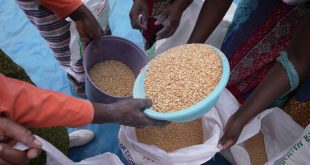The Australia Letter is a weekly newsletter from our Australia bureau. Sign up to get it by email.
SYDNEY, Australia — We’re binge-buying rapid antigen tests for immediate delivery. We get all our food left at the front door and keep masks in every room. I’ve even revived the indoor exercise regimen from my 14-day stint in Australia’s remote quarantine camp.
Covid, that lurker of a virus, has finally found us. My 11-year-old daughter tested positive last Friday, on the very day she was due for her second Covid vaccination. Our family of four is now one of many to be stuck at home in Sydney because of an outbreak moving through the city’s middle schools. Once again, we’re seeing a daily rise of tens of thousands of cases.
Is anyone to blame? How big a deal is it? When oh when will this pandemic end?
These are a few of the questions that come up while sitting around, again, the four of us, like we’ve been transported back to April 2020 — except this time, we’re isolation professionals. What an odd sensation, the familiarity of household entrapment. We shouldn’t be this used to staying in what we wore to bed the night before. Is it really 2 p.m. already? It’s been a week since some of us have put on shoes. Clearly, we would all get along better with more space or just less time living together within shouting distance.
But this is our normal now, or at least a version of it. The stop-start of daily life, the canceled plans for now and the tentative plans made for the immediate future — it’s so very 2020s. Whatever roaring the ’20s did last century has become a sigh this time around. Time can only exhale and stagnate. Sometimes I feel like I’m sitting in a lukewarm bath, trying to decide whether to get out or just add a little more hot water. My wife and I used to think of our lives in chunks of two years at a time. Now it’s more like 14 days.
I don’t resent it as much as I did before. During previous lockdowns, I was angrier, at my own lack of control and at perceived policy mistakes. Now, though, I feel like Australia has done what it can to get a hold on Covid. The death rates from the virus here are around one-thirteenth of what they are in the United States. Most of the Oz is vaccinated and boosted. When I flew to Queensland for work recently, everyone in the airport and on the plane obeyed the rules requiring that we still wear masks.
It’s just that the virus, well, it’s still what it has always been. Contagious. Annoying. Ever present, somewhere. And after two months of rain keeping us all inside in Sydney, the little spike protein is back on a brutal tear.
This time, with Omicron’s eased severity made even milder with vaccines, it’s less frightening. Australians have gone from being petrified of Covid to taking it mostly in stride.
WhatsApp messages flitter back and forth, from school group to school group, mostly relaying mild symptoms and well wishes for a speedy recovery. (If there’s anything you want to get out of for a week, now is certainly the time to claim Covid and hide.)
In our house, we’re learning to cultivate and prune our boredom. I create math problems for my two kids to yell at me about (“Dad, you’re so annoying!”). We play Wordle. We watch “Survivor” or the news and see our emotions go up and down with prognostications for democracy and for Ukraine. We live vicariously, through our windows and our screens, and hope that our week of forced isolation isn’t extended by another positive test.
And I guess it’s not that bad, not really. My daughter hasn’t gotten very sick. She cleaned her room today, so that’s good, and the rest of us are still testing negative with every swab we shove up our tender noses. The other night, I made two perfect dirty martinis.
Sure, we live on pause, but at least we live, very, VERY together. And if this is how it must be once in a while for the next few years, so be it. Covid, especially in what feels like its viral middle age, is a builder of filial patience. It thickens our minds, softens our ambitions, narrows our gaze, and as much as I hate it for what it has already robbed — in life and irreplaceable moments — I also know that most of us will survive. Not so long from now, we may even recall the odd moments of stamina with a bit of fondness.
“Come what may,” Virgil once wrote, “all bad fortune is to be conquered by endurance.”
Now here are our stories of the week.
 Top Naija News: Nigerian News, Breaking News Nigeria and World News Top Naija News is a daily news publication in Nigeria, delivering the latest breaking news in Nigeria and around the world.
Top Naija News: Nigerian News, Breaking News Nigeria and World News Top Naija News is a daily news publication in Nigeria, delivering the latest breaking news in Nigeria and around the world.



